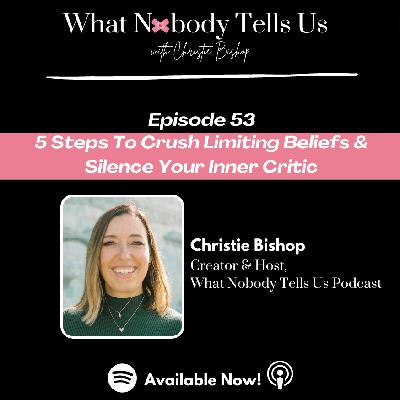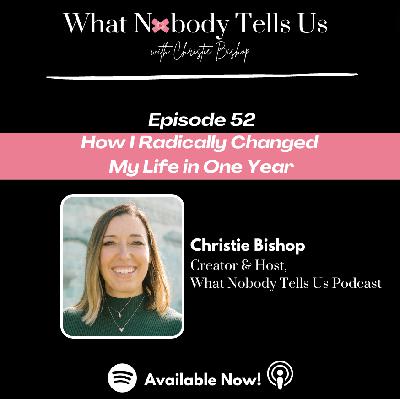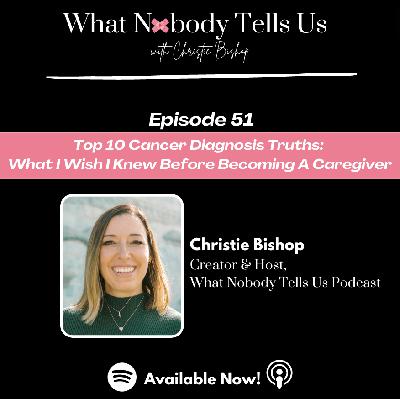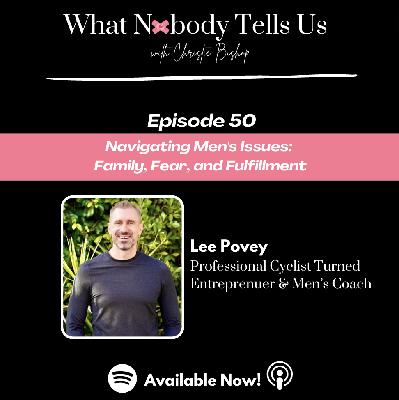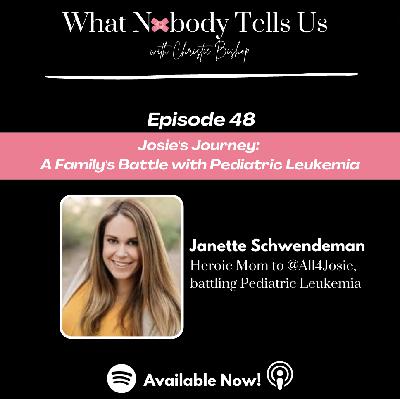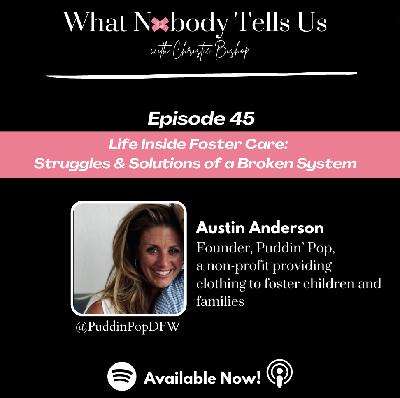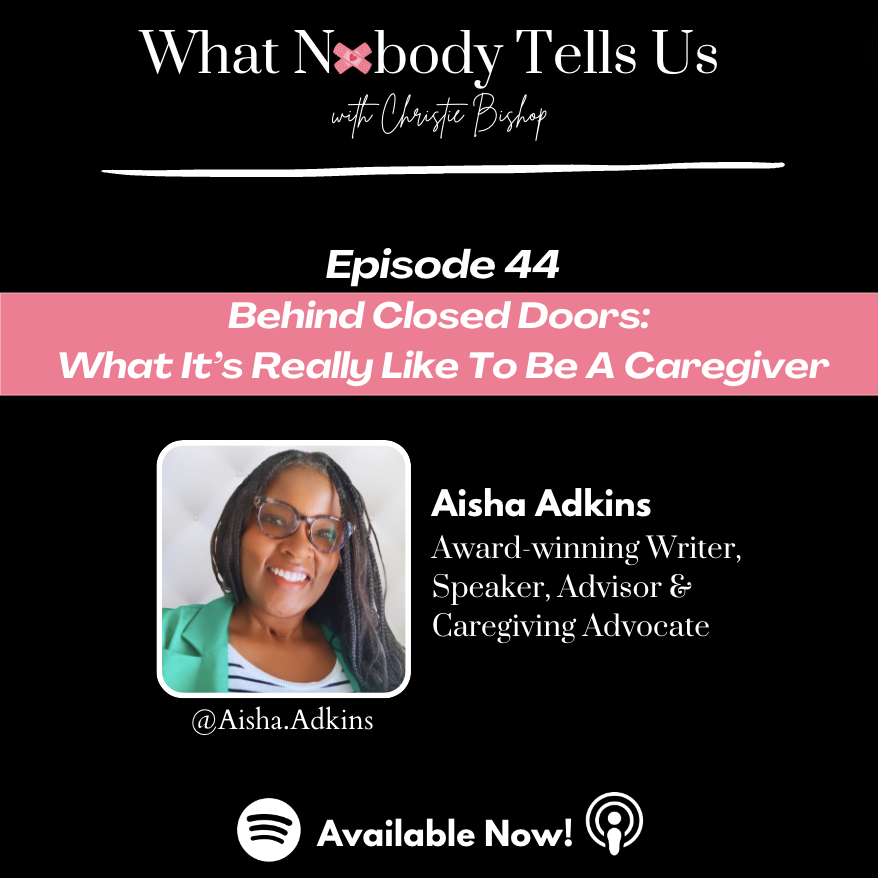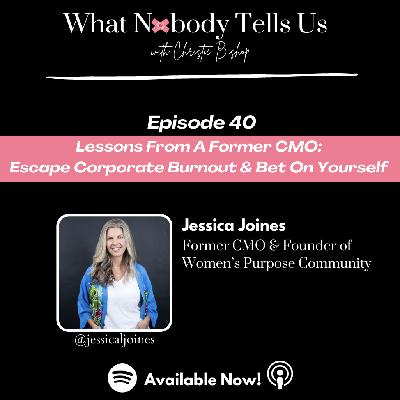Discover What Nobody Tells Us
What Nobody Tells Us

What Nobody Tells Us
Author: Christie Bishop
Subscribed: 10Played: 500Subscribe
Share
© 2023
Description
"What Nobody Tells Us" shares everything you need to know about the things no one wants to talk about. Our society too easily avoids uncomfortable conversations, leaving those going through tough times feeling isolated, overwhelmed, and stressed beyond belief. Few know this better than host Christie Bishop.
In 2009, at just 30 years old, host Christie Bishop's life and career were turned upside down when her then-fiancee, Bryan, was diagnosed with an inoperable brain tumor and given just six months to live. Christie's life went from wedding celebrations and climbing the marketing corporate ladder to living the devastating realities of cancer caregiving and feeling isolated from nearly everyone she knew. Christie knows the continuous overwhelm, confusion, isolation and stress that comes with facing a difficult personal situation -- it doesn't have to be cancer -- that society deems too uncomfortable to talk about. "What Nobody Tells Us" aims to demystify hard topics with compassion, insight, honesty and humor, supporting those who are going through it, as well as empowering friends and family to lean-in versus peace-out.
If you or a loved one are facing a life-changing diagnosis, struggling as a parent, confused about age-related hormone issues, battling weight gain, facing mental health challenges and more… "What Nobody Tells Us" is for you.
In 2009, at just 30 years old, host Christie Bishop's life and career were turned upside down when her then-fiancee, Bryan, was diagnosed with an inoperable brain tumor and given just six months to live. Christie's life went from wedding celebrations and climbing the marketing corporate ladder to living the devastating realities of cancer caregiving and feeling isolated from nearly everyone she knew. Christie knows the continuous overwhelm, confusion, isolation and stress that comes with facing a difficult personal situation -- it doesn't have to be cancer -- that society deems too uncomfortable to talk about. "What Nobody Tells Us" aims to demystify hard topics with compassion, insight, honesty and humor, supporting those who are going through it, as well as empowering friends and family to lean-in versus peace-out.
If you or a loved one are facing a life-changing diagnosis, struggling as a parent, confused about age-related hormone issues, battling weight gain, facing mental health challenges and more… "What Nobody Tells Us" is for you.
55 Episodes
Reverse
Have you ever caught yourself thinking, "I'm not good enough" or "I'll never succeed"? We've all been there, right? In this episode, I'm diving into those limiting beliefs that can hold us back, especially when it comes to personal growth. Fresh off my chat on the "Infertile AF" podcast, I got fired up about this topic. I realized something important: "All we have are ourselves." Our bodies, our minds, our spirits - they're the only ones we've got. So why are we so hard on ourselves? I'm sharing some real talk about how I've learned to flip the script on negative self-talk. It's not always easy, but trust me, it's worth it. We'll explore practical ways to spot those limiting beliefs and question them. Like, instead of thinking, "I'm too old for this new thing," how about, "My experience is an asset, and I have a ton to offer"? Sounds better, right? This is a process that takes time and patience. As I say in the episode, "Getting there is a process. It takes time." But I'm here to cheer you on every step of the way. Remember, "You are capable of so much more than you realize." So, are you ready to join me in crushing those limiting beliefs? Let's do this together, one positive thought at a time. After all, "The world has got so many difficult things happening already. We don't need to go down this wormhole of negativity about ourselves." Let's lift each other up instead!
This week officially marks an incredible milestone - the one-year anniversary of the "What Nobody Tells Us" podcast! I'm filled with gratitude and amazement at how far we've come together on this journey. In this special anniversary episode, I reflect on: The unexpected evolution of this podcast into a full-fledged entrepreneurial venture My bold career pivot from executive advertising to pursuing my true passion Strategies for facing fear and uncertainty to create radical change in your life I'm excited to share with you my top 10 strategies for upleveling your life. Here's a sneak peek at 5 of them: Future Self Journaling: Visualize and write about your ideal future self daily The Curiosity List: Cultivate continuous learning and exploration Habit Stacking: Attach new habits to existing ones for lasting change Thought Balancing: Counter each negative thought with a positive one The Puzzle Piece Theory: Trust that life's challenges are shaping your greater purpose Remember, we have "one wild and precious life" - let's make it count! Small, consistent steps can lead to transformative change. I cannot express enough gratitude for your support this past year. Your engagement, feedback, and stories have made this podcast what it is today. For the full list of life-changing strategies and more insights, be sure to listen to the full episode. And if you haven't already, I'd be thrilled if you subscribed to the WNTU newsletter for weekly inspiration and behind-the-scenes content. Here's to another year of growth, resilience, and uncovering what nobody tells us!
It's hard to believe a year has passed since I launched "What Nobody Tells Us." What a journey it's been, and I can't believe how it's grown and where it's led me. In this anniversary episode, I'm reflecting on the top ten truths I've learned about cancer diagnosis and sharing some heartfelt advice for all you incredible caregivers out there. I talk about the critical importance of self-advocacy - it's not just crucial, it can be a matter of life and death. I share ideas on how you can find your voice and never settle for care that doesn't meet your needs. I also discuss the game-changing power of building a strong support network, and share tips on how to ask for the specific help you need. It's not easy to do, but I open up about the emotional rollercoaster of caregiving. Having been there myself, I want you to know it's okay to experience a wide range of emotions, sharing strategies for finding moments of joy, even during the toughest times. Expect some practical tips too - from staying organized to setting healthy boundaries. It's all about making this challenging journey a bit more manageable. Looking ahead, I'm excited to take this podcast in new directions. We'll be diving deeper into specific aspects of caregiving and offering more resources to help you navigate your own path. I'm so excited to continue these important conversations and shed light on the things that nobody tells us - but that everyone should know.
Welcome to What Nobody Tells Us! Thank you for tuning in! Don't forget to subscribe, rate and review this podcast, and get on the list for the WNTU newsletter. In today's episode, I talk with Lee Povey, a former professional cyclist turned executive coach, to delve into the complexities of men's emotional health and societal roles. Lee shares his personal journey from cycling, influenced by a narcissistic father, to becoming a successful coach and advocate for men's mental well-being. Lee's story begins with his early years in Brighton, England, where he bonded with his father through cycling, despite his father's narcissistic tendencies. This relationship shaped Lee's understanding of masculinity and drove him to seek therapy and join men's groups, which became pivotal in his emotional development. Lee discusses the challenges men face today, from societal expectations to the rising rates of middle-aged male suicides, and emphasizes the importance of community and emotional intelligence. The conversation also explores Lee's coaching philosophy, which focuses on helping individuals—regardless of gender—become better versions of themselves. He shares practical tools for managing emotions and setting life goals, highlighting the significance of curiosity, intentionality, and self-awareness in personal growth. Whether you're interested in men's mental health, personal development, or effective leadership, this episode offers valuable insights and actionable advice. Lee's approach to coaching and life is a testament to the power of self-reflection and continuous improvement. Episode References Lee Povey Conscious Leadership Group 15 Commitments of Conscious Leadership (Book) Asana (Project Management Tool) Children of Emotionally Immature Parents (Book)
In this week's episode, I explore the intriguing concept of the Akashic Records with energy healer and Akashic Records reader, Karen Wilson. The Akashic Records are sometimes described as a "library for your soul," containing the history of your soul's journey across lifetimes. While this idea might seem esoteric or unconventional, Karen Wilson discusses it in a way that is both relatable and thought-provoking. Karen's own journey into the Akashic Records began after the devastating loss of her husband to a brain tumor. This painful experience sparked a spiritual quest that led her to various energy healing modalities and eventually, the Akashic Records. Her story illustrates how profound challenges can sometimes open up new paths of healing and understanding. During our conversation, Karen shares how the Akashic Records can potentially provide insights into various aspects of our lives, from our relationships and life purpose to even our pet's behavior. She explains that the records are not just about past lives but can also offer guidance for navigating current life situations. We also touch on how Karen blends her intuitive abilities with energy healing practices like Reiki, and the importance of maintaining spiritual hygiene by regularly clearing and balancing our energy. Whether or not you're fully on board with the concept of the Akashic Records, this episode offers an intriguing glimpse into the ways that spiritual practices can provide comfort, clarity, and direction for some individuals. Karen's story invites us to consider the possibility of seeking answers and healing beyond the physical realm.
In the latest episode of our podcast, we delve into a story Today's episode embodies hope, love, and resilience. My guest, Janette Schwendeman, shares her family's extraordinary journey through the harrowing experience of pediatric cancer. Janette's story begins with the birth of her third child, Josie. What should have been a time of joy and completion for their family took a sudden turn when Josie was diagnosed with acute lymphoblastic leukemia (AML) at just eleven weeks old. The diagnosis was a shock that left Janette and her husband, Casey, paralyzed with fear and uncertainty. Janette vividly recalls the moment she received the news. "When you're told your child has cancer and has a poor prognosis, it's paralyzing. Pure trauma," she says. The initial days were a blur of grief and confusion, but Janette's determination to fight for her daughter's life soon took over. She immersed herself in learning everything she could about the diagnosis, becoming Josie's fiercest advocate. The journey was incredibly challenging, especially since it took place during the height of the COVID-19 pandemic. Janette had to stay in the hospital with Josie for ten months, unable to leave or have visitors. Yet, she found solace in small blessings, like being able to Facetime her other children or order food from outside. "You have to find the glimmers of rainbows throughout it because they are there if you look," she advises. Janette's story is not just about the medical battle but also about the emotional and mental fortitude required to navigate such a crisis. She emphasizes the importance of a positive mindset and community support. "Focus on watering the seeds that are growing," she says, highlighting the need to nurture the relationships and aspects of life that bring joy and strength. One of the most heartwarming parts of the story is the role of Josie's older brother, Caden, who became her bone marrow donor. At just six years old, Caden showed incredible bravery and love for his sister. His donation was a turning point, leading to Josie's remission and a new lease on life. As Janette reflects on their journey, she shares valuable advice for other families facing similar challenges. "Find joy in the story you're living and seek support," she says. Her words are a reminder that even in the darkest times, there is hope and light to be found. This episode is a must-listen for anyone seeking inspiration and a deeper understanding of the resilience required to face life's toughest battles. Janette's story is a powerful reminder that while we cannot always control the cards we are dealt, we can choose how we play them. Tune in to hear the full conversation and be inspired by Janette Schwendeman's incredible journey. You won't want to miss it.
Welcome to the What Nobody Tells Us podcast! I'm so happy you're here! Before you hit play, make sure to subscribe, rate, and review the show wherever you listen. Don't forget to subscribe to my newsletter for in-depth looks at each topic, guest highlights, practical advice, and so much more. This week, we're diving into a topic that everyone thinks they understand but often don't: financial planning. Our guest, Chantel Bonneau Stewart, founder of WiseFit Wealth Management Solutions, joins us to demystify the complexities of managing your finances, planning for retirement, and making smart investment choices. Chantel shares her lifelong passion for finance, which began in third grade, and her journey to becoming a financial planner. She discusses the importance of having a clear understanding of your cash flow, protecting your credit score, and the critical role of organization in financial health. Chantel also breaks down the different types of investment vehicles, the misconceptions around retirement, and the importance of having a diversified portfolio. We also explore the challenges faced by those who are laid off and the strategies to manage finances during such difficult times. Chantel emphasizes the importance of starting early with retirement planning and provides actionable advice for those who feel it's too late to start. Whether you're just starting your financial journey or looking to refine your existing plans, this episode is packed with valuable insights and practical advice to help you achieve financial independence. Resources: - Learn more about Chantel Bonneau and Wise Fit - Explore all WNTU episodes - Subscribe to the WNTU weekly newsletter
Welcome to the What Nobody Tells Us podcast! I'm so happy you're here! Before you hit play, make sure to subscribe, rate, and review the show wherever you listen. Don't forget to subscribe to my newsletter for in-depth looks at each topic, guest highlights, practical advice, and so much more. In this heart-wrenching yet profoundly uplifting episode, we walk through the unimaginable journey of Ashley Jones, a mother who faced the devastating loss of her infant daughter, Skylar. Ashley's story is one of unimaginable grief, but also of extraordinary resilience and purpose. Ashley was a young wife and mother when her daughter Skylar was diagnosed with spinal muscular atrophy (SMA), a terminal illness. Despite the prognosis, Skylar lived for 21 months, during which Ashley and her husband Kyle embraced every moment with her, learning invaluable lessons about life, love, and purpose. Through our conversation, Ashley shares the profound impact of Skylar's life and how it led her to found the Momento Foundation, formerly known as Love Not Lost. This nonprofit organization provides free portrait sessions for families facing terminal diagnoses, offering a tangible way to remember and process their grief. We explore the transformative power of photography in Ashley's healing journey and how these cherished mementos have helped other families navigate their grief. Ashley's insights into the layers of grief, the importance of community support, and the need for empathy in the workplace are both enlightening and deeply moving. Whether you're a parent, a caregiver, or someone seeking to understand the complexities of grief, this episode offers a beacon of hope and a reminder that even in the darkest times, love and purpose can shine through. Resources - Learn more about the Momento Foundation - Join the Momento Collective for community support and resources - Explore all WNTU episodes - Subscribe to the WNTU weekly newsletter
What do you think of when you hear the words "Foster Care?" I have to admit that before talking to today's guest, I was woefully uninformed about the topic and was quick to assume things that were simply just wrong. Today we're leaving assumptions behind and getting informed on the foster care system, learning the harsh realities these children face and the life-changing impact of ordinary people stepping up to help. This week's podcast guest, Austin Anderson, founder of Puddin' Pop, is one of those heroes. Austin's journey into foster care advocacy began with a startling realization: children in the system were facing unimaginable challenges, often with little support. Determined to make a difference, she started Puddin' Pop, an organization based on Dallas, TX, that provides personalized care packages to foster children, reminding them that they are seen, loved, and not forgotten. Follow Puddin' Pop on IG to donate and see stories of the children they've helped. We dive into the complexities of the foster care system, address common misconceptions and stereotypes surrounding foster children and families, and shed light on the realities they face. One of the most pressing issues highlighted in our conversation is the "aging out" crisis, aka the challenges faced by foster youth as they transition into adulthood without the support of a permanent family. Austin emphasized the critical need for comprehensive support services and programs that extend beyond the age of 18 to ensure these young adults have the resources and guidance they need to thrive. Perhaps the most powerful takeaway from our conversation is the idea that anyone can make a difference in the lives of foster children. Austin shared various ways to get involved, from becoming a respite provider or volunteering at local foster care organizations to simply donating clothing or other essential items. She stressed that every act of kindness, no matter how small, can have a profound impact on a child's life. I encourage you to learn more about Austin Anderson and Puddin Pop by visiting their website at puddinpop.org or following their inspiring journey on social media. If you were moved by this episode, please share it with your friends and family, and consider getting involved in supporting the foster care community in your own way. Together, we can make a difference.
Welcome to the What Nobody Tells Us podcast! I'm so happy you're here! Before you hit play, make sure to subscribe, rate and review the show wherever you listen. Don't forget to subscribe to my newsletter for in-depth looks at each topic, guest highlights, practical advice and so much more. If you're a caregiver, know a caregiver, or simply want to understand the caregiving experience better, this episode is for you. When we talk about illness, we often focus on the patient, their journey, and their recovery. But behind every patient is a caregiver, whose story is seldom told, whose struggles are often unseen, and whose courage is rarely acknowledged. In this week's episode, we're pulling back the curtain on the life of a caregiver with an extraordinary guest, Aisha Adkins. Aisha's story is not just about caregiving; it's a tale of resilience, sacrifice, and profound love. Her mother's diagnosis with frontotemporal degeneration (FTD) – the same condition affecting Bruce Willis – thrust her into a decade-long journey that would shape her life in ways she never imagined. In our emotional conversation, Aisha and I share the raw and real aspects of caregiving. We talks about the anticipatory grief that haunts us every day, the emotional trauma that lingers, and the PTSD that caregivers endure. We also discuss the importance of caregiver support, the overlooked aspects of mental wellness, and the journey towards finding a new normal after loss. But it's not just about the hardships. Aisha's story is also about the unexpected lessons, the joys found in simple moments, and the personal growth that emerges from the toughest of times. Visit christiebishop.com for more episodes and information on Christie's caregiving resources, workshops, and customized coaching programs. Let's start the conversation and bring the stories of caregivers into the light. Resources: Learn more about Aisha Adkins Looking for a personal rebrand? Overwhelmed by caregiving responsibilities? Looking to "re-enter" life after caregiving? Check out Christie Bishop's coaching services.
Welcome to the What Nobody Tells Us podcast! I'm so happy you're here! Before you hit play, make sure to subscribe, rate and review the show wherever you listen. Don't forget to subscribe to my newsletter for in-depth looks at each topic, guest highlights, practical advice and so much more. May is Mental Health Awareness month, and there are few things that have such a profound impact on our mental well-being than trying to start a family. As so many parents and would-be parents know, the journey is rarely as straightforward as society would have us believe. This week's podcast episode delves into a topic that's often kept in the shadows: secondary infertility. My guest, Ali Prato, host of the popular podcast "Infertile AF," shares her deeply personal and often misunderstood experience. Ali's first pregnancy was a dream: straightforward and uncomplicated. But when it came time to expand her family, she was faced with an unexpected and heart-wrenching struggle. The assumption that having a second child would be easy quickly unraveled as she encountered miscarriages and the daunting world of fertility treatments. In a candid conversation, Ali opens up about the emotional toll of secondary infertility. She discusses the impact it had on her sense of self, her parenting, her body, and most significantly, her marriage. It's a story that many can relate to but few are brave enough to discuss openly. Ali's journey led her to create Fertility Rally, a support system for women at any stage of their fertility journey. Through this community, she's fostering connections and providing a space for shared experiences and support. But perhaps the most poignant part of Ali's story is her message of hope and advocacy. As we observe Mental Health Awareness Month, this episode highlights the profound mental health implications of fertility issues. It's a call to normalize conversations around secondary infertility and to advocate for those silently suffering. Resources Listen to Ali's Infertile AF podcast Learn more about Fertility Rally Explore all WNTU episodes Subscribe to the WNTU weekly e-newsletter
Welcome to the What Nobody Tells Us podcast! Before you hit play, make sure to subscribe, rate and review this podcast. Share it with a friend and subscribe to my newsletter for in-depth looks at each topic, guest highlights, practical advice and so much more. Parenting is an adventure filled with unexpected twists and turns. But what if you had a guide to help you navigate the complexities of raising a child? That's exactly what we dove into in our latest podcast episode with KJ Altoff, the director of content for Big Life Journal. In this eye-opening conversation, we discuss the stigmatized topic of parenting challenges. KJ shares her personal journey and the mission of Big Life Journal, which provides resources to foster growth mindsets and resilience in children. From physical journals to a supportive community, they offer the dialogue and scripts parents need to empower their kids and themselves. But it's not just about the tools. It's about the real, raw moments that all parents face. KJ opens up about her own struggles and the 'confessions' from other parenting experts at Big Life Journal. These stories resonate with anyone who's ever felt the weight of parental responsibility. We explore the concept of 'reparenting' ourselves as we raise our children, a task that requires us to address our triggers and learn to regulate our emotions. KJ provides practical tips for managing the morning rush, dealing with tantrums, and the importance of repairing our relationship with our children after a conflict. Listening to this episode is like having a heart-to-heart with a friend who gets it. KJ's vulnerability and expertise create a safe space for parents to learn and feel supported. If you're looking for guidance, inspiration, or just a reminder that you're not alone on this journey, this episode is a must-listen. As KJ eloquently puts it, parenting is a rollercoaster that never ends. There will be highs and lows, but learning to support yourself and your child through those moments is what makes the ride worthwhile. So, grab your headphones, find a quiet moment, and give this episode a listen. You might just find the encouragement you need to face your next parenting challenge with a little more grace and a lot more confidence. And remember, in the world of parenting, you're not just surviving—you're growing, learning, and, most importantly, you're not alone. Resources Learn more about KJ Althoff and Big Life Journal Explore Big Life Journal's journals for kids of all ages Follow @BigLifeJournal on Instagram Follow KJ @GentleHealingMom on Instagram Explore all WNTU podcast episodes Subscribe to the WNTU weekly newsletter
Welcome to What Nobody Tells Us! Before you hit play, make sure to subscribe, rate and review this podcast. Share it with a friend and subscribe to my newsletter for in-depth looks at each topic, guest highlights, practical advice and so much more. In today's episode, we step into a world that's often left behind closed doors: the world of couples therapy. Vanessa Morgan, a licensed Marriage & Family Therapist, joins me to unravel the mysteries and stigmas surrounding this form of therapy that's not just for rocky relationships, but also for those seeking to prevent issues in the first place. Vanessa's approach is both eye-opening and comforting. She likens couples therapy to preventative medicine – something that equips you with tools for when times get tough. It's so much more than a business transaction, too; rather it is often a deeply intimate process in which a therapist has the privilege of helping people uncover the most delicate and valuable parts of themselves. Throughout our conversation, we tackle the hard-hitting topics: the stigma around therapy, the importance of understanding attachment styles, and the tools for long-term relationship success. We also dive into how couples therapy can be a beacon of hope for parenting struggles, chronic illness, and major life transitions. What makes this episode stand out is Vanessa's empathy, directness and passion for her craft. She demystifies the process of therapy, sharing a gold mine of insights for anyone looking to understand the complexities of human connections. If you've ever wondered about couples therapy or felt alone in your relationship struggles, this episode is a must-listen. It's a reminder that seeking help is a sign of strength, not weakness, and that investing in your relationship is one of the most loving things you can do. Vanessa's clients have told her that her approach is empathic, straightforward and insightful. You may be a good fit for Vanessa's counseling if you are self-reflective and highly motivated to discover how you are contributing to the current dynamics in your life. To Vanessa, therapy is so much more than a business transaction; rather it is often a deeply intimate process in which a therapist has the privilege of helping people uncover the most delicate and valuable parts of themselves. Resources Learn more about Vanessa Morgan Contact Vanessa: vanessamorgantherapy@gmail.com | (949) 424-3226 Want to hear more? Check out all my episodes here. Want to see some of my Amazon faves? Check them out here. Vanessa's Book Recommendations:
Have you ever caught yourself sprinting on the treadmill of life, relentlessly chasing success, achievement, and societal validation, only to find yourself gasping for air, wondering if there's more to life than this relentless pursuit? In this week's episode, I have the privilege of hearing from Jessica Joines, a former advertising executive who's intimately familiar with the burnout that comes from this endless chase. She shares her raw and enlightening journey from the depths of corporate exhaustion and alcoholism to the heights of finding her purpose and founding the Women's Purpose Community. Jessica and I go deep into self-discovery and the elusive journey towards finding one's purpose. Her story is not just inspiring; it's a roadmap for those of us who feel lost, burnt out, and disconnected from our true selves. Her transformation is a testament to the power of listening to your heart and daring to believe in yourself. The episode delves into the concept of ascension (not as complicated as it sounds), the importance of vulnerability, and the practical steps to uncover your soul's purpose. Jessica's insights, drawn from her own experiences and her book "Dare to Believe: 12 Lessons for Living Your Soul Purpose," offer a guide to navigating your journey of self-discovery. If you're feeling stuck, questioning your purpose, or yearning for a deeper connection to who you really are, this episode is a beacon of hope. It will inspire you to take that leap of faith, trust the process, and most importantly, trust in yourself. Remember, the dreams in your heart are there for a reason—they are what you're meant to do. Let Jessica's journey inspire you to start your own. Listen now and dare to believe in the power of your purpose. Resources: Learn more about Jessica Buy Jessica's book, Dare to Believe: 12 Lessons For Living Your Soul's Purpose Join the Women's Purpose Community Learn more about Christie Subscribe to WNTU weekly newsletter
Dive into the beauty aisle with us in this week's episode of "What Nobody Tells Us," where we unpack the tween beauty product craze sweeping through the aisles of Sephora and beyond. I sit down with Natasha V. Glasgow, a licensed esthetician, beauty contributor and member of ELLE Magazine's Beauty Advisory Board, and mom to a 10-year-old daughter. Natasha's on a mission to demystify the skincare world for parents and their tweens, so let get to it. With the rise of social media and peer influence, Natasha shares her firsthand observations from her undercover trips to Sephora, discussing the "smoothie" phenomenon, and the allure of brands like Drunk Elephant for the younger crowd. We tackle the hard-hitting topics: the product pitfalls that could harm developing skin, the financial pressures of keeping up with the Joneses, and the emotional rollercoaster that comes with tween self-discovery and self-care. Natasha brings her expertise and a mother's touch to the conversation, providing practical tips on navigating this delicate terrain. From fostering open dialogue with your children about beauty and self-worth to identifying the skincare essentials that are truly age-appropriate, Natasha's guidance is a beacon for parents wading through the cosmetic chaos. Whether you're a parent to a tween, or simply someone who cares about nurturing healthy self-esteem and body image in the younger generation, this episode is a treasure trove of wisdom, empathy, and empowerment. Remember to share this episode with anyone navigating the tween beauty product phenomenon, and as always, don't forget to subscribe, rate and review wherever you listen. References: Learn more about Natasha Find Natasha on Instagram Explore more WNTU episodes Inquire about Christie's consulting and coaching services
Welcome to What Nobody Tells Us and thanks for listening! Before you hit play, don't forget to subscribe, rate and review the podcast. I'd also love for you to sign up for my weekly newsletter, which dives deeper into each week's topic in an entertaining and insightful way. In this week's episode, I sit down with Kismet Salem, a gifted energy healer and spiritual guide. We have a captivating discussion about how so many of us feel disconnected, numb, and just going through the motions in our modern lives. Kismet shares profound insights into "spiritual anatomy" and how unblocking our subtle energy channels can help reignite our spark and reawaken us to our truest selves. She provides highly practical tips for "active meditation" that anyone can do, as well as simple ways I can start clearing out psychic clutter and negativity. Whether you embrace spirituality or just want to feel more alive and joyful again, this episode will inspire you to get your sacred flame burning brilliantly once more. Time Stamps: 0:00 - 3:15 My introduction and overview of today's themes 3:15 - 6:22 Kismet's background and the work she does 6:22 - 11:35 Our discussion of "spiritual anatomy" - the subtle energy systems of the body 11:35 - 16:40 Signs that your spiritual anatomy may be blocked or stagnant 16:40 - 22:15 Kismet's approach to "active meditation" through movement, art, nature 22:15 - 26:20 Benefits of active meditation and reigniting your inner fire 26:20 - 31:00 The importance of clearing out psychic clutter and toxic energy drains 31:00 - 36:15 Kismet's parting insights & reminders for me to reawaken my spirit regularly References: Chakra System Overview Article on Benefits of Meditation Book: Eastern Body, Western Mind by Anodea Judith Connect with Kismet: Website: https://kismetsalem.com/ Instagram: @kismetsalem
Welcome to What Nobody Tells Us! If you love what you're hearing, don't forget to subscribe, rate and review my podcast wherever you listen. Share it with a friend, and subscribe to my newsletter for in-depth looks at each topic, guest highlights, practical advice and so much more. In this week's episode, I sit down with Aki Ito, award-winning chief correspondent at Business Insider, who recently published a fascinating article unraveling the complex and evolving topic of workplace loyalty, entitled The End of Workplace Loyalty - Why Work Feels So Broken Right Now, and How It Can Be Repaired. Whether you're a seasoned executive, a recent graduate, or somewhere in between, this episode offers a examination of what it means to be loyal in today's workforce and how we can collectively forge a new, more humane, and equitable contract for the future. As we navigate the seismic shifts in employer-employee dynamics -- especially driven by the pandemic -- Aki sheds light on the sobering fact that the era where companies and employees were deeply committed to each other has now become a thing of the past. We explore the history of workplaces, from the booming post-World War II era to present day, and how the once-sacred psychological contract between companies and their workforce is being rewritten. Aki's insights shed light on how different generations view loyalty, showing that it's not just about age but about everyone wanting respect and honesty in their work relationships. We delve into the impact of technology, remote work, and the Great Resignation on the delicate balance of trust. Aki also explores the phenomenon of 'overemployment' -- aka working multiple full-time jobs at once -- and how the state of New York has established legislation against it. Tune in to this thought-provoking dialogue and join the conversation about the death and rebirth of workplace loyalty. And remember, if you're seeking guidance, whether in your career or caregiving journey, visit christiebishop.com for coaching opportunities that can support you on your path forward. About Aki Ito: Aki Ito is chief correspondent at Business Insider, where she covers the workplace and the economy. Her biggest features have reported on the salary transparency revolution, the rise and fall of hustle culture, the dangers that AI poses for workers, and the "overemployment" phenomenon. She has also written about the economy's tumultuous transition to remote and hybrid work, the Great Resignation's unintended consequences on salaries, the surge in warehouse employment, and the tech layoffs. In 2022, Aki's story about recovering overachievers dialing back at work sparked the national firestorm over quiet quitting. That story, along with her feature about the end of hustle culture, won the National Press Club's award for cultural criticism and was a finalist for the Gerald Loeb Award in commentary. Aki's journalism has also won awards from organizations including SABEW, the New York Press Club, the San Francisco Press Club, the Institute on Political Journalism, the Webbys, the Northern California chapter of the Society for Professional Journalists, and the Society of Publishers in Asia. Episode Chapters: (00:00) Christie Bishop explores the death of workplace loyalty in this podcast (07:24) Aki It's role at Business Insider (08:26) Describing Aki's article about the death of workplace loyalty (09:49) The psychological contract shapes expectations and behaviors between employers and employees (11:19) Aki describes changes in expectations of workers vs. that of employers over 100 years (21:21) Technology has changed the way employees view loyalty to their employers (23:48) Research shows remote work reduces loyalty to employers and vice versa (25:50) What was the impact of the great resignation on workplace loyalty (29:40) The role of perks in terms of staying at a company (32:41) Aki wrote an article about overemployment and its implications for loyalty (36:38) Aki interviewed boomers and millennials about workplace loyalty (44:16) The most important thing is for employees and employers to rewrite contract (53:43) Aki describes her follow up to her original article based on feedback from readers
Welcome to What Nobody Tells Us! If you love what you're hearing, don't forget to subscribe, rate and review my podcast wherever you listen. Share it with a friend, and subscribe to my newsletter for in-depth looks at each topic, guest highlights, practical advice and so much more. In today's episode of "What Nobody Tells Us," I'm joined by professional mediator, Gabrielle Hartley, to give listeners critical tools to stop fighting and start getting along. Gabrielle isn't just an expert mediator, she's also author of The Secret To Getting Along (And Why It's Easier Than You Think) as well as co-chair of the American Bar Association's (ABA) Mediation Committee. She offers practical steps and solutions for anyone stuck in a never-ending loop of fighting, whether it's with your spouse, a colleague, or even your kid. In our candid conversation, Gabrielle shares her own journey with conflict, both professional and personal, and how it led her to create the revolutionary YES method, a simple yet profound strategy for de-escalating tension and fostering understanding in any relationship. Her approach is radical yet rooted in empathy, urging us to look inward, identify our roles in conflict, and find the emotional core of our disagreements. By shelving our heated arguments and taking a step back, we can move forward more with less heat and more harmony. If you're on the brink of a fallout, or simply want to improve your relationships, this episode is for you. Gabrielle's wisdom is not just enlightening; it's a guide to transform your conflicts into opportunities for growth and connection. Gabrielle's insights are universally applicable and desperately needed in our polarized world. Don't forget to share this episode with someone who might need it, subscribe for more insightful conversations, and leave a review to tell me why you love each episode. And for those hungry for more, my weekly newsletter is packed with deep dives into each episode, guest spotlights and practical advice that will leave you inspired. Subscribe at christiebishop.com. Resources: Learn more or work with Gabrielle Hartley Better Apart: The Radically Positive Way To Separate by Gabrielle Hartley The Secret to Getting Along (And Why It's Easier Than You Think) by Gabrielle Hartley Kate Anthony's "Should I Stay or Should I Go?" Facebook Page Bill Eddy's High Conflict Institute How to Talk So Kids Will Listen & Listen So Kids Will Talk by Adele Faber and Elaine Mazlish Contact Christie for speaking engagements, training, coaching, and marketing consulting Subscribe to Christie's WNTU Newsletter Episode Chapters: (05:19) Gabrielle and Christie talk about how to get along (06:04) Gabrielle Harper is a divorce attorney and a mediator (11:36) You wrote Better Apart after years of mediation on divorce (15:43) Can you describe kind of the different types of conflicts? (21:48) Five destructive behavioral tendencies (27:38) If someone doesn't have a trained muscle around apologizing, what do you say? (30:29) Love language is acknowledgment (30:59) The YES method involves acknowledging the love language (33:43) The secret to getting along is to really listen more than we talk (39:59) Creating a strategic plan for tackling disagreements (42:55) Gabrielle says mediation can help people salvage their relationships (50:11) What are some of the consequences of leaving conflicts unresolved? (56:27) Using these techniques is very much trying to consciously parent your children (59:05) Any final advice that you can think of to give to people who are experiencing conflict
Welcome to What Nobody Tells Us! If you love what you're hearing, don't forget to subscribe, rate and review my podcast wherever you listen. Share it with a friend, and subscribe to my newsletter for in-depth looks at each topic, guest highlights, practical advice and so much more. In this week's pivotal episode of "What Nobody Tells Us," we confront the digital elephant in the room: the complex relationship between our children and the behemoth that is social media. As parents, guardians, and mentors, we grapple with questions that keep us up at night: When should our children get their first phone? How do we protect them from predators on the internet? And what about the unseen impacts of social media on their developing minds? Joining me is Drew Cingel, an award-winning associate professor and researcher from UC Davis' Department of Communication. Drew's area of research examines how human development influences how individuals use media, and how media use influences human development, specifically child and adolescent development. Specifically, he studies the effects of social media on adolescent social-emotional development, children's learning from media, including television and tablet computers, and the influence of media on child and adolescent moral reasoning. His work has been published in journals such as New Media & Society, Media Psychology, Journal of Media Psychology, Computers in Human Behavior, and the Journal of Children and Media. He has also received funding from the Television Academy, Arts and Sciences Foundation. Drew and I navigate the treacherous waters of cyberbullying, body image, privacy breaches, and the predatory behaviors lurking behind seemingly innocent quizzes. But it's not all doom and gloom; Drew also highlights the empowering side of social media, where underrepresented voices find community and solace. We examine the regulatory safeguards other countries have implemented and how we might follow suit. This episode is a wake-up call, a guide, and a beacon of hope, all rolled into one. It's a conversation that could redefine the way you and your family interact with the digital world. So, whether you're a parent to a toddler or a teenager, or simply someone who cares about the future of our society, this is an episode you need to hear. References: Drew's Published Research UC Davis' Media Lab Want to hear more? Every What Nobody Tells Us episode is available here. Looking for a career or caregiving coach? Let's work together. Find my Amazon faves here. Episode Guide: (00:00) This episode is for parents of adolescent youth with questions about social media (04:36) Drew talks about the social media impact on our kids (05:16) Professor David Katz directs human development and media lab at UC Davis (08:00) There are negative correlations between social media use and aspects of mental health (12:05) I want to explore the idea of social media addiction, because addiction obviously can (13:06) Even through adolescence, individuals have not developed self regulation on social media (16:02) Social media can help adolescents achieve developmental goals when used in a healthy manner (18:56) The modeling of the behavior is huge. So if we're modeling that behavior for our children (22:34) Social media can move adolescents toward feeling less socially connected and lonely (24:04) Study of fake 716 year olds with poor mental health using algorithms (29:40) Something interesting happened to me on Twitter last week (30:49) In South Korea, there are some notable differences in social media regulations (36:12) Media in general tends to negatively influence body image among both males and females (41:07) Have you seen any positive impact on social media due to pushing back against perfection trends (45:30) How prevalent is cyberbullying on social media platforms amongst youth (47:31) Long term effects of cyberbullying on a child's mental health are unclear (54:12) There is evidence linking social media use to negative impacts on school performance (57:05) I do want to talk about the positive aspects of developing community within social media (01:01:59) Social media has made the world so much smaller and in a really good way (01:03:58) What privacy risks are children and teenagers facing when using social media (01:07:35) Last week I saw a set of quizzes that could be used by hackers (01:09:05) What are things that we can do to keep our children safe online
Are you loving "What Nobody Tells Us"? Don't forget to subscribe, rate and review the show podcast, share it with a friend, and subscribe to my weekly newsletter! Raising a strong-willed child can be a roller coaster of emotions, where one minute you're in sync, and the next, you're facing a full-blown rebellion. If this sounds like your life, this week's episode with Bryana Kappadakunnel, CEO of @consciousmommy and Infant-Family Early Childhood Mental Health Specialist, is a must-listen. We discuss the labels society places on children, such as "strong-willed" or "big-feeling," and how these can impact a child's development. Bryana eloquently dismantles these stereotypes, urging parents to see our children as sensitive beings who are learning to navigate their emotions and the world around them. During our conversation, I open up about my own challenges parenting our daughter, Tessa. The stories we share are both heartwarming and painfully relatable, highlighting how hard it is to navigate even our own kids' emotional landscape. Bryana gives practical advice, stressing the importance of self-reflection and inner child work for parents. She explains how our reactions to our children often stem from our own past experiences, and how acknowledging this can transform our parenting approach. The episode isn't just about the challenges. It also celebrates the unique strengths of strong-willed children: Their intelligence, creativity, and potential to become leaders. Bryana's insights encourage us to embrace these qualities and guide our children in using them positively. Bryana also shares her wealth of knowledge on topics ranging from sibling conflict and discipline alternatives to handling tantrums and boosting self-esteem. Her approach is rooted in conscious parenting; a philosophy that emphasizes understanding and empathy over punishment. That philosophy is also a gentle reminder for parents that taking care of ourselves is NOT selfish; it's essential. It allows us to be present, patient, and more effective in guiding our children. Whether you're a new parent or have been in the trenches for years, this episode is a treasure trove of wisdom and encouragement. It's a call to action to keep calm, parent on, and remember: You're not alone on this wild ride called parenting. Episode References Bryana Kappadakunnel Instagram | Facebook | Website Christie Bishop Subscribe | Coaching | Marketing Consulting | Email Kelly LeVeque, CCN (Be Well by Kelly) Instagram | Website | Protein Powder


